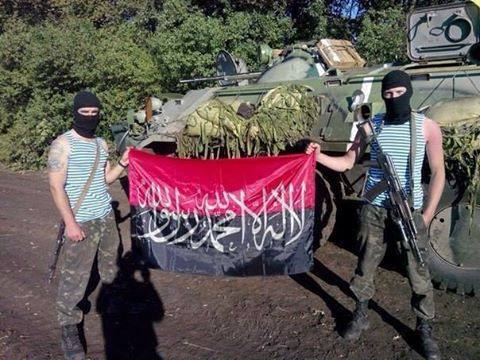The following is an interview with state security expert, Dr. Andrzej Zapałowski. He was formerly a member of the Polish and European parliaments, where in the latter he was Vice Chairman of the delegation to the EU-Ukraine Parliamentary Cooperation Committee and a member of the Committee on Agriculture and Rural Development. At the moment he is a senior lecturer at the University of Rzeszow.
You have said that 70,000 prisoners out of a total of 140,000 are to be released in Ukraine. You also suggest that the melting pot of Ukrainian nationalists, released criminals, refugees infiltrated by ISIS, and an uncontrolled flow of weapons can be a threat to the whole Europe – starting from the border with Ukraine. Could you elaborate on this issue in the context of the wall that could potentially be built on the border between Poland and Ukraine?
In Ukraine there is a draft of a bill which proclaims amnesty for about 70,000 prisoners. The head of the State Penitentiary Service of Ukraine reports that within this group, about 1,000 murderers might be released. On top of that, there is an ongoing criminalisation of political life among the nationalist volunteer units in Ukraine. The nationalists have lost support from some of the oligarchs, so now they lack the necessary resources to continue. They do not answer directly to the Army or the Ukrainian Ministry of Internal Affairs, so they have to take care of themselves. Therefore, they are trying to take over sectors that were previously dominated by organized crime. It turns out, for example, that a few kilometres of the Ukrainian-Slovak border have been overtaken by criminal groups, according to local media reports. We are dealing with a situation where not only is Ukraine the most corrupt country in Europe, and one of the most corrupt countries in the world, but is additionally a state in which successive groups are making profits from organized crime.
You have to remember that in the war in Donbas, Chechens who are accused of terrorist activities and of having associations with ISIS are fighting on the Ukrainian side. The Ukrainian Security Service estimates that at least 70–80 people might be linked to ISIS in Ukraine.
We know that ISIS and Ukraine have a common enemy: Russia. Turkey, in turn, supports ISIS, something which was recently confirmed by Russia. In this context, how do you understand the statement of the Ukrainian politician and leader of the Crimean Tatars, Mustafa Dzhemilev, who said that Turkey is ready to consider supplying Ukraine with needed military equipment? In view of this, are we dealing with ISIS setting up in Eastern Ukraine, and thus in Europe?
ISIS is already in Eastern Europe. The Dzhokhar Dudayev Battalion has been accused of blowing up pylons that carried electricity to Crimea. Turkey, which has considerable military potential, will probably not support the Tatars in Ukraine so much, but rather Ukraine directly, in an effort to intensify its military operations against Russia. The situation makes it clear that Turkey would be very keen on a Ukrainian offensive in Donbas, and therefore declares that it will provide the Ukrainian Army with modern, offensive military weapons. This is highly dangerous in the context of a further destabilisation of Eastern Europe.
Eight million immigrants will try to get to Europe this year, warns the German Minister for Economic Cooperation and Development, Gerd Müller. What do you think will happen to Europe in the long term, in the context of such a large migration and the arrival of ISIS militants hiding among refugees?
It has been officially stated that during this year alone, 80,000 people have already fled to Greece. All these people will soon move through Bulgaria and the Romanian Carpathians and into Ukraine. I’m afraid that with such a deep economic collapse, the entire Ukrainian criminal underworld – and not only that – will make it possible to smuggle immigrants into Poland and Slovakia, and this will create a huge industry. In fact, the ships that will depart from Turkey by sailing through the Black Sea will eventually arrive at the Ukrainian ports and unload thousands of immigrants, who will later be transported to the Slovakian and Polish borders.
If Western Europe continues to put pressure on migration, we will face a situation where Alternative for Germany will have support on the level of several dozen percentage points, and France will elect a president like Ms. Le Pen. If, by the beginning of 2017, we see a big change in Western Europe, these immigrants will be sent back. The only question is where to. Some sub-Saharan African countries have openly declared that they will not take their citizens back, as in the case of the Afghan government (sic). Of course, some of the consequences will also be suffered by the members of the Visegrád Group.
The important issue here is a dynamic Catholicism that pushes Islam back. All these immigrants who are coming to Europe are not only followers of Islam, but they are also actively practicing this religion. These people are part of a mission to convert Europe to Islam, and perhaps this is why the centres which govern them insist that this first wave is arriving in countries that are already so atheistic that they have abandoned their Christian roots. This obviously makes them an easy target. In the context of a living Catholicism, Central Europe will thus witness a violent conflict between vital Catholicism and dynamic Islam.





 del.icio.us
del.icio.us
 Digg
Digg
Les commentaires sont fermés.